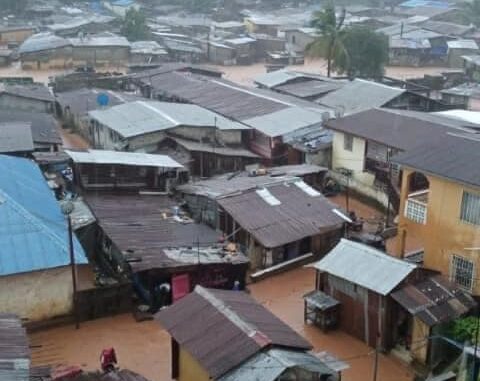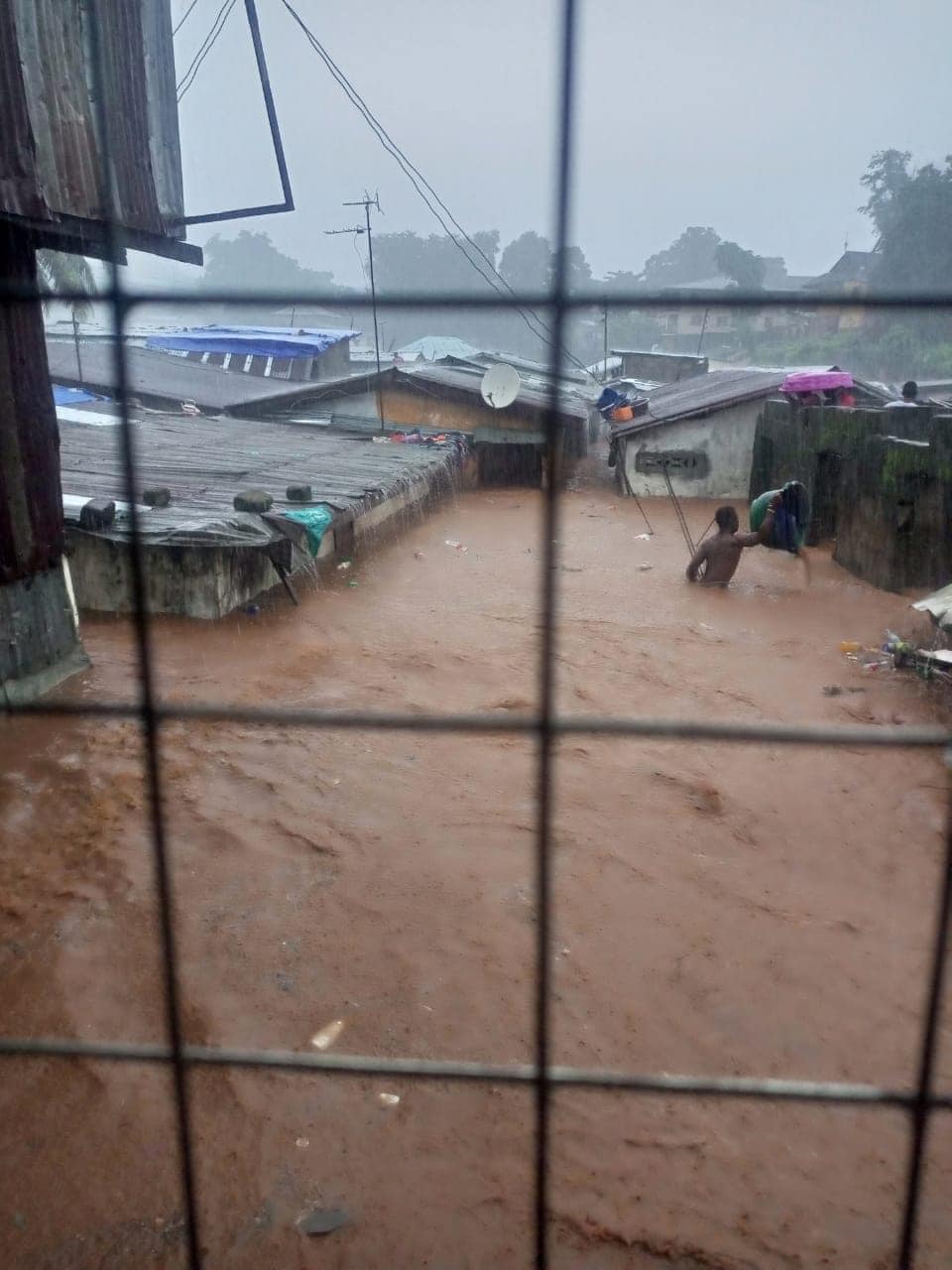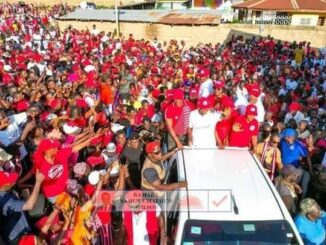
Former Information and Communications Minister and now strategic adviser on public health information to the interim national coordinator of the COVID-19 response, Dr. Julius Spencer , is one of many Sierra Leoneans who responded to the mudlide disaster in Freetown yesterday, with this interesting and instructive article.
Julius Spencer
It is Sunday morning the 28th of August. And as I sit at my writing desk in my room, it’s raining cats and dogs, as they say, and has been doing so since last night. This morning I have had to punch a hole in the ceiling almost directly above my desk to drain water that has settled there from a leaking roof because the rain has been so heavy. So I now have a bucket by my side to catch the water.
I have not gone to church today, as I am sure most Freetonians too haven’t, because of the rain which seems unusually heavy and unrelenting. As I expected, there has been widespread flooding in Freetown and the images circulating on social media are mind boggling. Dundas Street is a fast flowing river; Bay as usual has houses almost covered with water and people walking on rooftops. In Kaningo, houses close to the banks of the river flowing towards the Juba bridge (which now has two names) only have their second storeys visible above the water. There has been widespread flooding in Regent and a landslide has occurred at Kissy that has buried some houses resulting in 5 deaths so far. These are only a few of the disastrous occurrences today. But why am I not surprised?
I am not surprised because what is happening today had been predicted long ago, but unfortunately not much has been done over the years to prevent it occurring or at least reduce its impact. It is also clear that the situation is going to get worst, so let’s prepare ourselves for many more landslides and flood disasters in the coming years.
It is clear to me that what is happening today is the result of a combination of the effects of climate change and the massive environmental degradation that has happened in the Freetown peninsular and other parts of the country. And what is most annoying is the fact that while we could not have done anything about global climate change caused by global warning, we could certainly have done something about environmental degradation.
For those of us who grew up in Freetown and are old enough, the massive damage that has been done to our environment by human activity, particularly unplanned housing construction, is glaring. A few examples of what it was like when I was a boy.
I grew up on Byrne Lane, and from our kitchen window and verandah, we had a clear view of the Aberdeen creek and we marvelled at the sight of water skiers going in and out of the creek which was festooned with mangroves on both sides. There was no bridge linking Murray Town with Aberdeen and if you wanted to get to Aberdeen, you had to either go through Lumley or use what we called the ferry, which was actually a big boat with a boatman using a long pole to push the boat along, or you could wait for low tide and wade across.
Today, all the mangroves have disappeared and have been replaced by buildings right up to the water’s edge. Hill Station was a forest reserve and there were no buildings in most of the area. If we had to go to Regent, we had to go by government bus and going through the forest was quite scary. Now, Hill Station is an unplanned concrete jungle. The waterfall on the hillside going up Mount Aureol, which is called White Wata, was so named because it was a fast flowing waterfall all year round. Today, it is only fast flowing during or soon after heavy rains. After that, it slows to a trickle. I had my office on Circular road for about 18 years and from the verandah of the building, I could see the mountains all the way up to Leicester Peak and during those 18 years, I saw the forest gradually disappearing and being replaced by houses.
I said earlier that the flooding and landslides we are experiencing today, will get worse in the coming years, because we continue doing the things that are making them happen. Primarily, we continue to deplete the forest cover on our hills and mountains and replace them with houses.
Now, why are we getting so much flooding today which was non-existent 30 or 40 years ago? The answer is simple. We have destroyed our forests. Let me explain for those who have no understanding of environmental issues. When there is a lot of vegetation on the land and it rains, seepage takes place. In other words, the water seeps into the soil because of the tree roots that not only bind the soil but provide a pathway for the water into the soil. Without vegetation, the water flows across the surface of the soil and very little seeps into it, particularly in hilly areas.
Without vegetation, the soil is totally exposed and is washed away by the water. This is why these days, apart from the plastic garbage that can be found in the drainage in the city, we see a lot of soil in them. And this did not start today.
When I was in government, I remember President Kabbah coming to one cabinet meeting and raising the issue of the amount of soil that has to be cleared from the gutters in Freetown after each heavy rainfall. It was realised that it had something to do with the loss of the forest cover and a cabinet sub-committee was set up with Dr. Sama Banya as chairman, due to his long experience working on conservation issues. I was a member of the committee. We had several meetings and the environmental officer in the Ministry of Lands prepared an action plan for what needed to be done to arrest the situation. The plan was presented in Cabinet, but unfortunately, the budget was quite large, and Pa Kabbah had an aversion for spending money. Thus ended that effort.
When I first heard that Sierra Leone was ranked 2nd or 3rd among countries most prone to the effects of climate change, I was a bit puzzled, but now it is quite clear why this is so. Our topography and what we have done to our forest cover indeed makes us ripe for the negative impact of climate change. Add to that our long coastline and what we have done to it, and you can see the disaster we are heading for. The mangrove swamps in many parts of our coastline that provide a natural barrier to the effects of coastal erosion have been badly depleted. Rampant sand mining along the Freetown peninsular is also exacerbating the impact of sea level rise. I’m sure we have all seen the images and videos of what has happened in some villages along the peninsula, where buildings have collapsed and what used to be gentle slopes into the see have now become cliffs. So can this situation be reversed? I very much doubt that, not only because we are already too far gone, but also because we continue to engage in the same environmental destruction that we have been doing over the years.
While I recognise that there is huge pressure for land for housing in the Western Area, I also know that something can be done to reduce the impact of housing and other human activities on the environment. I therefore propose that the following be done as a matter of extreme urgency.
- A special Environment Preservation task force be set up with a mandate to come up with actionable proposals for slowing the destruction of our environment. Alternatively, the Environmental Protection Agency (EPA) can be tasked to produce the plan, if one does not exist.
- An immediate ban be placed on felling trees on hillsides
- The building inspectorate be reactivated and capacitated to carry out inspection of current housing in disaster prone areas, as well as supervising any new building construction. I am sure there are adequate laws in place that just need to be enforced.
- A massive tree planting exercise should be conducted on the hills and mountains along the Freetown peninsula.
- Those living in disaster prone areas should be compulsorily removed and relocated to less fragile areas.
- A ban be placed on the production, importation and use of single use plastics. This has been done in many countries, including African ones. I can think of Kenya and Rwanda as shining examples.
- Active consideration be given to a ban on the use of sea sand for housing construction. This will obviously have to be implemented over time because it will require a shift to the use of river sand and mud bricks.
As I write these suggestions, I know I am wasting my time, because they will never be adopted. Why? Because politics and politicking will not allow us to do so. Political parties need votes to win elections and many of the voters currently live in disaster prone areas, including along the coastline. Will our politicians recognise the looming catastrophe and put our collective interest above their political ambitions? I very much doubt that this will happen because history does not support it.
So as I listen to the sound of the pouring rain I can visualize Freetown in 20 to 30 years-time. Many hillsides have collapsed, most of our sandy beaches have been transformed into rocky ones, those areas that were near the sea front all along the Freetown peninsular have disappeared into the sea and the land no longer slopes gently into the sea, but has been replaced by steep cliff faces. Many of the houses currently perched on the hillsides leading to Mount Aureol, Leicester Peak and Mount Sugar Loaf have rolled down with the top soil onto houses below the hills and only large outcrops of rocks can be seen on the hillsides. Water is a scarce commodity outside the rainy season, because even though a dam larger than the current Guma Dam has been built, it only has water in the rainy season and dries up completely in the dry season. In addition, wells and even bore holes run dry soon after the rainy season ends. In 2040s Freetown, the most common crime is water theft and obituary announcements are full of deaths by drowning, landslides and mudslides.
And don’t bother to say let us pray to God to avert this nightmarish scenario, except if our prayers are focussed on God giving our politicians the presence of mind and the courage to come together and take the necessary urgent action to avert it. God does not come down or interfere directly in human affairs anymore, so if we are waiting for him to come down and solve our self-inflicted looming disaster, our prayers will be in vain.
As my late mother used to say, “God helps those who help themselves.”
____________________________________________________
There is No Such Thing as a Natural Disaster – We are Doing it to Ourselves ( © Mansa Musa Kamara )
Over the years, we have all been saddened by the news of floods, landslides or surface subsidence wrecking deadly havoc in different areas within and around Freetown. In fact, we have become so accustomed to these occurrences in certain hotspots that we worry every time there is heavy downpour of rain. To many, it is just bad luck while it is considered a predestination for others. As such, every year we feel powerless and only hope and pray that the rainy season will spare us.
But this has to change! We cannot keep hoping and praying without taking concrete actions and expect the results to be different. We need to stop seeing these issues as merely natural occurrences that are bound to happen; because there is no such thing as a natural disaster – every disaster event has our hands all over it. As such, we need to take a proactive and holistic approach to prevent these disasters from occuring.
The rains are a part of the Earth’s processes which have been refined by nature’s forces over billions of years. However, over the years, we have observed that the amounts and intensities of rainfall have become erratic and variable – an observation which is mostly attributed to human activities both at local and global scales.
In the Western Area Peninsula to be specific, we continue to take away most of the natural barriers meant to shield us from the impacts of these variabilities by cutting down trees (which help hold the soils on slope intact, control the intensity of rainfall on the ground as well as the speed of rainfall runoffs) and haphazardly replaced them with settlements without any spatial planning that takes into consideration the proper functioning of the city.
We have allowed development to go uncontrolled even in areas assessed to be at high risk of disaster events; thereby increasing our population’s exposure to naturally occurring hazards. Substandard buildings continue to be constructed unchecked and worse so in important water catchments and drainage channels. Ironically, we build in floodplains and expect the floods to go away.
Whilst we do not try to reduce waste via a nationally recognised strategy, no effort is even made to control its disposal. Communities are allowed to sprawl out of control, with no designated public waste collection site. Even efforts to gainfully engage our youth in door-to-door waste collection has not stopped a large portion of the City’s population from indiscriminately dumping waste in open areas, on streets or drainages.
Sadly, while we are busy making ourselves ‘comfortable’, we are blinded to the fact that we are destroying our life support systems; thus exposing ourselves to these very risks that go against the preservation of life. As a result, we see floods, landslides, and other disasters destroy lives, properties, causing massive economic losses to individuals, businesses, communities and the state.




